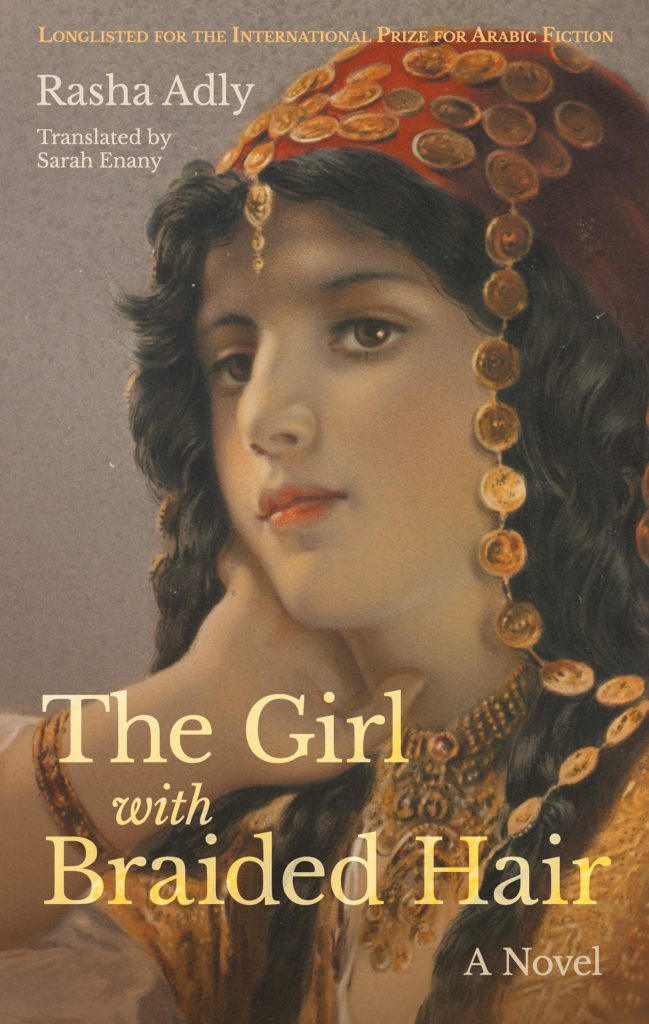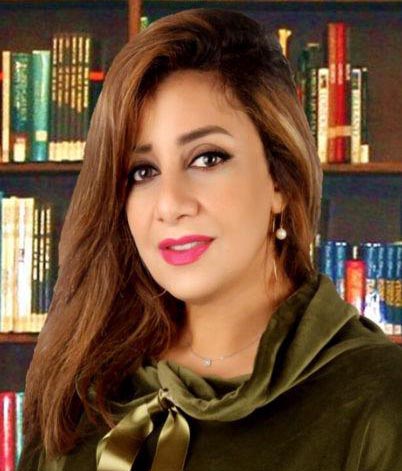Receive Our Newsletter
For news of readings, events and new titles.

The Banipal Trust for Arab Literature is pleased to announce that the 2021 Saif Ghobash Banipal Prize for Arabic Literary Translation is awarded to Sarah Enany for her translation of the novel The Girl with Braided Hair by Rasha Adly, published by Hoopoe Fiction. Following the shortlist of five titles that was announced on 23 November 2021, the judges are unanimous in naming Sarah Enany as the winner of the £3,000 prize, to be awarded by the Society of Authors on 10 February 2022.
The judges in this 16th year of the Prize comprised Roger Allen (Chair), Professor Emeritus of Arabic & Comparative Literature, University of Pennsylvania; Rosemarie Hudson, Founder Publisher, HopeRoad Publishing; Ronak Hosni, Professor of Arabic and Translation Studies at the American University of Sharjah, and Caroline McCormick, Director, Achates.



THE JUDGES’ REPORT
This year’s winner of the Saif Ghobash Banipal Prize is Rasha Adly’s novel Shaghaf (Passion), superbly translated into English by Sarah Enany as The Girl with Braided Hair. Dedicated by its author “to everyone who has been defeated by life or had their dreams broken”, it is a wonderful combination of art and history, of contemporary Egypt and its 18th-century past, as it recounts the stories of two women. In the modern era, Yasmine embarks on some research in order to find out the history of a painting of a beautiful woman, that is unsigned and that she is helping to restore. After a good deal of research, it turns out to be the work of Alton German, a French artist and writer who accompanied Napoleon on his invasion of Egypt in 1798.
In this narrative, skilfully segmented into its two time frames, the reader is taken back to the earlier period and provided with both a vivid picture of the ruthlessness of the French invasion and, reflecting the original Arabic title, the infatuation that the painter feels for Zeinab, the subject of his painting. Zeinab, the lovely daughter of a prominent sheikh at the Al-Azhar Mosque in Cairo, has attracted the attention of Napoleon himself and risks alienation from her own family by responding to the flattering attentions of such foreigners and their very different cultural values and behaviour.
The judges were all impressed by the skill with which the author dexterously combines history, art, passion, and politics in the different but connected stories of these two Egyptian women, each story line being subdivided into multiple segments, frequently prefaced by specific dates, whether 1798 or 2012. The resulting narrative – a multi-textured story of love, war, and the ruthlessness and privileges of the invader – draws the reader into its two eras and worlds, as the quest for information about the portrait and its artist is interspersed with historical detail about Napoleon’s invasion and its impact on Egypt, Cairene society, and on Zeinab herself. The subtle and beautifully crafted translation faithfully echoes the style of the author.
Sarah Enany’s highly accomplished translation was praised by the judges for its accuracy and its ability to combine the two separate narratives into a seamless text that is a pleasure to read. In the words of one judge: “I was looking for a gem, and I found it in The Girl with Braided Hair.”
The judges discussed the other four shortlisted works, notable contributions to Arabic fiction in high-quality translation, but they were unanimous in their choice of Adly’s novel for the excellence and readability of both its original and translated versions.
ABOUT THE WINNING TRANSLATION
The Girl with Braided Hair
Reactions from the translator, the author and the publisher
 Translator Sarah Enany said:
Translator Sarah Enany said:
"I’m thrilled that my translation of Rasha Adly's The Girl With Braided Hair has won this year's prestigious Saif Ghobash Banipal Prize. I’m very grateful to Hoopoe and the AUC Press for giving me this opportunity, and to the judges for their kind words about the translation. I hope this award will encourage English-language readers to enjoy this richly detailed and poignant novel.“
 Author Rasha Adly wrote:
Author Rasha Adly wrote:
“I am very happy to hear this good news. Thank you to the judges, thank you to the administration of the award, and congratulations to Sarah Enany.”
Nadine El-Hadi, Acquisitions Editor of Hoopoe Fiction, said:
 “We are delighted that Sarah Enany’s impressive skill as a translator has been recognized with this prestigious prize. She deserves great commendation for her translation of Rasha Adly’s intricate and rich novel The Girl with Braided Hair into eloquent, vivid English, and we are proud to have been the novel’s publisher in translation.”
“We are delighted that Sarah Enany’s impressive skill as a translator has been recognized with this prestigious prize. She deserves great commendation for her translation of Rasha Adly’s intricate and rich novel The Girl with Braided Hair into eloquent, vivid English, and we are proud to have been the novel’s publisher in translation.”
ABOUT THE TRANSLATOR
 Sarah Enany is a literary translator and an Assistant Professor in the Department of English Language and Literature at Cairo University. She has translated a number of works including by Yusuf Idris, Mohamed Salmawy, Ahmed Aboul Gheit (Witness to War and Peace: Egypt, the October War, and Beyond) and is best known until now for her translation of the three novels of Kamal Ruhayyim’s “Galal” trilogy – Diary of a Jewish Muslim (2014), Days in the Diaspora (2012) and Menorahs and Minarets (2017), all published by AUC Press. She also translated Victor Hugo’s Les Misérables into colloquial Egyptian Arabic.
Sarah Enany is a literary translator and an Assistant Professor in the Department of English Language and Literature at Cairo University. She has translated a number of works including by Yusuf Idris, Mohamed Salmawy, Ahmed Aboul Gheit (Witness to War and Peace: Egypt, the October War, and Beyond) and is best known until now for her translation of the three novels of Kamal Ruhayyim’s “Galal” trilogy – Diary of a Jewish Muslim (2014), Days in the Diaspora (2012) and Menorahs and Minarets (2017), all published by AUC Press. She also translated Victor Hugo’s Les Misérables into colloquial Egyptian Arabic.
ABOUT THE AUTHOR
Rasha Adly is an Egyptian writer, born in Cairo in 1972. She is a researcher and freelance lecturer in the history of art, and is Cairo correspondent for the Emirates Culture magazine. Her writing career began with a blog in 2007, and she published her first novel, Sakhab al-Samt (The Clamour of Silence), in 2010. She is the author of eight novels, of which Shaghaf (2017) was longlisted for the International Prize for Arabic Fiction in 2018 and is published in English translation as The Girl with Braided Hair. Her novel Akhir Ayyam al-Basha (The Last Days of the Pasha) was longlisted for the 2020 International Prize for Arabic Fiction.
ABOUT THE BOOK
 The Girl with Braided Hair by Rasha Adly (Egypt)
The Girl with Braided Hair by Rasha Adly (Egypt)
Published by Hoopoe Fiction (imprint of AUC Press), November 2020.
ISBN 9789774169878. Pbk. 324 pages. £14.18. eBook/Kindle. £10.62
Set across two time frames, this novel masterfully weaves together the stories of two remarkable Egyptian women, one in the present day, and one at the turbulent close of the 18th century. When art historian Yasmine comes across the captivating portrait of a young woman from the Napoleonic time in Egypt, she is driven to uncover the mysterious circumstances of its creation. Meanwhile, Zeinab, the striking beauty from the painting, finds herself seduced by the glamour and prestige of the French colonial elite in Cairo, setting her on a dangerous course which could ultimately alienate her from the local Egyptian society and culture she knows. Adly skilfully draws the reader into these two very different yet intertwined worlds in this rich tale of history, art, war, and passion.
1 – THE AWARDS PRESENTED IN AN ONLINE CEREMONY, HOSTED BY THE SOCIETY OF AUTHORS
– Save the Date – 10 February 2022 / 6PM / online
Join us online for the Society of Authors Translation Prizes 2021
2 – AN EVENING WITH WINNER SARAH ENANY & HER AUTHOR RASHA ADLY with CHAIR OF JUDGES PROF ROGER ALLEN
This event is hosted by Banipal, the Banipal Trust and Arts Canteen. It will be a live event. You can register to join it on Eventbrite. You can join it on Facebook, or on YouTube. There will be a surprise interlude during the evening's programme. More about that later. Click on the image to register.
Thursday 17 February 5pm GMT
For all information about the prize, click here
For information about Saif Ghobash, the father of our sponsor's family, whose name is given to the prize, click here
For more about the 2022 prize – entries can be submitted until 31 March 2022, click here
For more information about the Banipal Trust for Arab Literature, click here